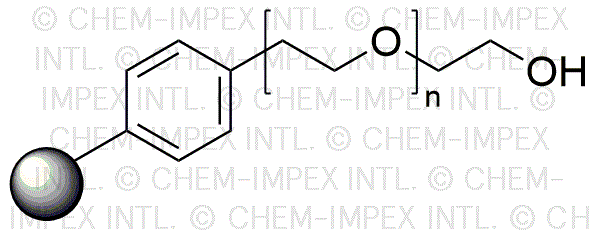TentaGel N OH Resin (180 - 250 µmol/g, 90 µm) is widely utilized in research focused on:
- Peptide Synthesis: This resin is ideal for solid-phase peptide synthesis, allowing researchers to create peptides efficiently while ensuring high purity and yield.
- Drug Development: Its application in drug discovery enables the synthesis of compound libraries, facilitating the identification of potential drug candidates through high-throughput screening.
- Bioconjugation: The resin's functional groups allow for easy attachment of biomolecules, making it suitable for creating bioconjugates used in diagnostics and therapeutics.
- Material Science: In polymer chemistry, it serves as a versatile building block for creating novel materials with tailored properties for various applications.
- Analytical Chemistry: The resin can be employed in sample preparation techniques, enhancing the analysis of complex mixtures in various fields such as environmental and food chemistry.
General Information
Properties
Safety and Regulations
Applications
TentaGel N OH Resin (180 - 250 µmol/g, 90 µm) is widely utilized in research focused on:
- Peptide Synthesis: This resin is ideal for solid-phase peptide synthesis, allowing researchers to create peptides efficiently while ensuring high purity and yield.
- Drug Development: Its application in drug discovery enables the synthesis of compound libraries, facilitating the identification of potential drug candidates through high-throughput screening.
- Bioconjugation: The resin's functional groups allow for easy attachment of biomolecules, making it suitable for creating bioconjugates used in diagnostics and therapeutics.
- Material Science: In polymer chemistry, it serves as a versatile building block for creating novel materials with tailored properties for various applications.
- Analytical Chemistry: The resin can be employed in sample preparation techniques, enhancing the analysis of complex mixtures in various fields such as environmental and food chemistry.
Documents
Safety Data Sheets (SDS)
The SDS provides comprehensive safety information on handling, storage, and disposal of the product.
Product Specification (PS)
The PS provides a comprehensive breakdown of the product’s properties, including chemical composition, physical state, purity, and storage requirements. It also details acceptable quality ranges and the product's intended applications.
Certificates of Analysis (COA)
Search for Certificates of Analysis (COA) by entering the products Lot Number. Lot and Batch Numbers can be found on a product’s label following the words ‘Lot’ or ‘Batch’.
*Catalog Number
*Lot Number
Certificates Of Origin (COO)
This COO confirms the country where the product was manufactured, and also details the materials and components used in it and whether it is derived from natural, synthetic, or other specific sources. This certificate may be required for customs, trade, and regulatory compliance.
*Catalog Number
*Lot Number
Safety Data Sheets (SDS)
The SDS provides comprehensive safety information on handling, storage, and disposal of the product.
DownloadProduct Specification (PS)
The PS provides a comprehensive breakdown of the product’s properties, including chemical composition, physical state, purity, and storage requirements. It also details acceptable quality ranges and the product's intended applications.
DownloadCertificates of Analysis (COA)
Search for Certificates of Analysis (COA) by entering the products Lot Number. Lot and Batch Numbers can be found on a product’s label following the words ‘Lot’ or ‘Batch’.
*Catalog Number
*Lot Number
Certificates Of Origin (COO)
This COO confirms the country where the product was manufactured, and also details the materials and components used in it and whether it is derived from natural, synthetic, or other specific sources. This certificate may be required for customs, trade, and regulatory compliance.

